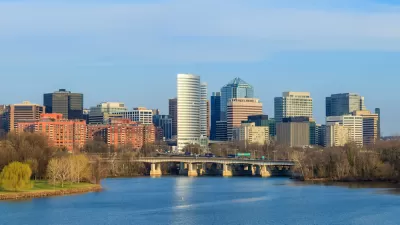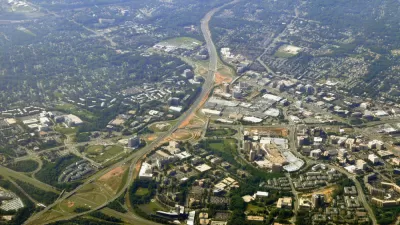In the Virginia suburbs outside of D.C., the radical plan to reshape auto-oriented Tysons Corner into vibrant, walkable Tysons is going ahead, despite skepticism that the monumental task can be accomplished, reports Corinne Reilly.
Two years into Fairfax County's four-decade plan to redevelop "a soulless, sidewalkless sea of superblocks, office buildings, highways and car dealerships" into "an urban, vibrant, walkable, downtown built around residents and rail" is beginning to move forward, block by block, writes Reilly, "[a]nd there is no turning back."
"'No one in the history of mankind has ever tried to do this' in a place that is already so developed — and developed entirely around cars and commuters, said Christopher Leinberger, with the Metropolitan Policy Program at the Brookings Institution. 'There is nowhere to look for a model for this kind of transformation.'”
"What is wrong with Tysons Corner, at least in the eyes of county officials, is what’s missing," says Reilly. "There are very few sidewalks, parks, neighborhood hangouts and places to live — none of the things that make a city a city. Instead, the 1,700-acre swath of Fairfax is home to nine times as many parking spaces as people."
"But now that the county has embarked on the redevelopment effort [seventeen redevelopment proposals are in the pipeline], some remain skeptical that such an ambitious, expensive urban retrofitting will ever come to fruition. Will anyone want to live in place long known for shopping malls and some of the region’s most horrific traffic? Will a shaky market emerging from recession support such development?"
"What is happening in Tysons is garnering interest far beyond the Washington region. If the transformation is a success, some believe it will serve as a model for rebuilding edge cities across the nation and beyond."
FULL STORY: Tysons Corner, on the verge of a do-over

Alabama: Trump Terminates Settlements for Black Communities Harmed By Raw Sewage
Trump deemed the landmark civil rights agreement “illegal DEI and environmental justice policy.”

Study: Maui’s Plan to Convert Vacation Rentals to Long-Term Housing Could Cause Nearly $1 Billion Economic Loss
The plan would reduce visitor accommodation by 25% resulting in 1,900 jobs lost.

Planetizen Federal Action Tracker
A weekly monitor of how Trump’s orders and actions are impacting planners and planning in America.

Wind Energy on the Rise Despite Federal Policy Reversal
The Trump administration is revoking federal support for renewable energy, but demand for new projects continues unabated.

Passengers Flock to Caltrain After Electrification
The new electric trains are running faster and more reliably, leading to strong ridership growth on the Bay Area rail system.

Texas Churches Rally Behind ‘Yes in God’s Back Yard’ Legislation
Religious leaders want the state to reduce zoning regulations to streamline leasing church-owned land to housing developers.
Urban Design for Planners 1: Software Tools
This six-course series explores essential urban design concepts using open source software and equips planners with the tools they need to participate fully in the urban design process.
Planning for Universal Design
Learn the tools for implementing Universal Design in planning regulations.
Caltrans
Smith Gee Studio
Institute for Housing and Urban Development Studies (IHS)
City of Grandview
Harvard GSD Executive Education
Toledo-Lucas County Plan Commissions
Salt Lake City
NYU Wagner Graduate School of Public Service





























